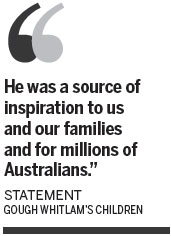The government redefined Australian foreign policy when it recognized China, before the United States and many other Western nations.
More dramatically, it ended military conscription and withdrew all Australian troops from the Vietnam War, and then established diplomatic relations with the Democratic Republic of Vietnam. 
The "White Australia" policy, which had restricted immigration by non-Europeans for about a century, was finally abolished.
On the home front, the government boosted expenditure on education, the plight of Aborigines, health, the arts and welfare.
Whitlam called and won a snap election in 1974 after the conservative opposition tried to block many of his reforms.
Governor-General Sir John Kerr broke the deadlock when he dismissed the government, and Whitlam as prime minister.
Despite a public outcry, Labor lost new elections and stayed in opposition until 1983. Whitlam retired from Parliament in 1978.
He was born Edward Gough Whitlam in Melbourne on July 11, 1916. He was brought up in the Australian capital of Canberra, where his father, Fred, was a government lawyer.
Whitlam studied law at Sydney University and served as an Australian air force bomber navigator during World War II before entering Parliament in 1952.
His wife, Margaret, whom he married in 1942, died in 2012.
